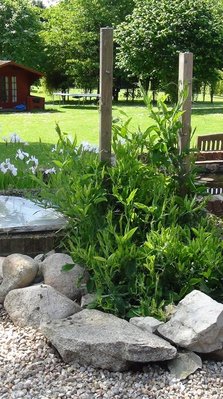
Throughout the day it felt wrong to be even thinking about the idea of playing games so I spent quite a lot of time in my garden (which ironically is a sort of game for me) doing physical things that made me feel better. I made a sort of crude memorial by placing some granite boulders I had around some posts with sweet peas growing on them. They are not out yet but they will be soon, and when they are out in all their glory they will be brilliant reminder to remember the people who have died.
Things that go on in our lives do interfere with and affect one another. I did manage to read and comment on most of the posts that were made today. In my readings (perhaps I was looking for it) I sensed there was a tension between those who are really enthusiastic about play and games in education, who have clearly experimented and proved to themselves there worth and others that were more reticent in their acceptance. I think I fall into the latter camp. Simon Rea articulated something of what I felt in his post
'I guess this is where I have issues with Play and Games in teaching ... it's the process of transferring from one domain (play/fun/game) to another (learning/assessment/work). I think people, students included, see the two domains as different which should be kept different, and see it as a sort of dumbing down activity. And anyway, people don't play games when they finish HE and get a job do they … my parents don't play games …'
Sarah Honeychurch made an interesting point: I've never really liked games, but I do love playing with new tools. Here's today's diversion from work http://www.nomadwarmachine.co.uk/2017/05/23/cogdogvidblog/ She shared her use of Lumin5 tool which can be used to turn a blog post into a video with music. It was the first time I and others had come across this tool and it inspired several people to try it out. I had a go but found myself spending a lot of time editing down my DAy1 blog post to the point where it didn't make sense so I gave up - I think you have to be in the mood and I wasn't really. But I did enjoy the Lumin5 creations of others in particular Gillian Judson's contribution https://lumen5.com/v/1vd/ which I have embedded to show myself how it works.

A game that I enjoy is about honouring those in my Professional Learning Network (PLN). It involves these things: close/slow reading, using new digital tools, curating, remix, sharing, fun.
How to play this game: Choose a blog post of someone in your PLN or curate information from open sources. Complete a slow read of the material. Pick a digital tool that can help you remix the blog post while keeping the original intention. Share it out and acknowledge the author. Here are two examples that I created today. In this remix, I look at Sundi's blog post on Intentional Practices. Taproot Blues has been created from a set of tweets. I've put them together, nearly a poem! These were created with Lumen5 desktop application. It uses images from unsplash.com and you can choose music to go with the work.
Posted by Wendy Taleo
I loved the idea of 'honouring' as a 'game' involving respectful remixing' and showing the creator that he or she had inspired you to add your ideas to their creation to make something different. This process of adding and combining lies at the heart of much of our creativity. The idea resonates with my day 1 post on 'caring'. Honouring is a way of demonstrating you care. Wendy's post contained an answer to Simon's post.. if we see honouring as a form of play then a lot of what we do as academic's when we write a paper is about remixing and recontexualising the thoughts and ideas of others. Similarly, when we take a idea for educational practice that someone has shared and rework it within our own pedagogical thinking and then use it in our own practice - we are honouring the originator and inspirer of that idea (but how often do we say this publicaly). This was my most important insight today and I am left thinking about how I honour the ideas that are gifted to me. I guess sharing them in my blog is a form of honouring. So thank you Wendy.
The thought I am left with is that this notion of honouring in the digital world of artefacts should be something we are teaching in higher education. We clearly teach the rules of plagiarism which is the dominant form of honouring in the academic world, but as Wendy points out the digital open world of learning offers so much more opportunity for playing this game.

I think Wendy must have taken pity on my inadequacies because by Friday she had generously used her time and creativity to show me how to use the LUMIN5 tool to create a new artefact from my blog. It felt quite humbling to have someone caring enough to show me what I could do if I set my mind to it. I felt as if my words had been honoured. So here it is - thanks to Wendy Talaeo
 RSS Feed
RSS Feed